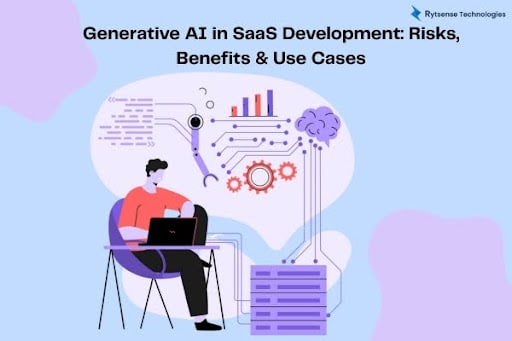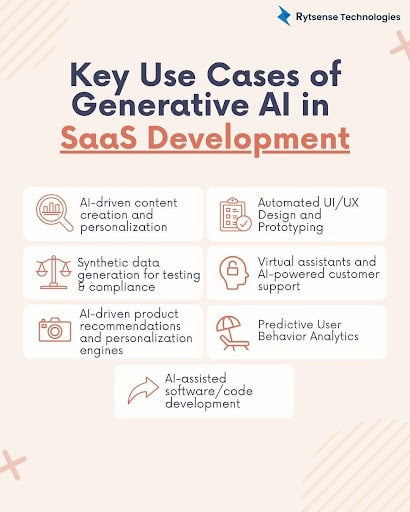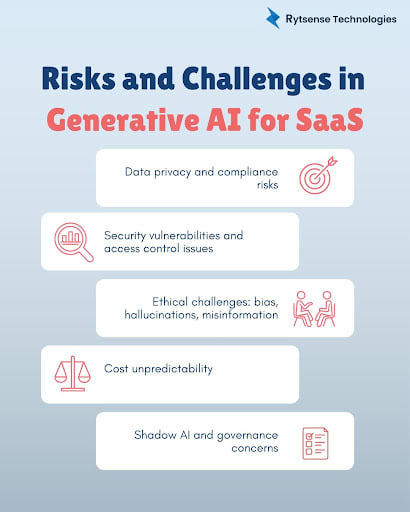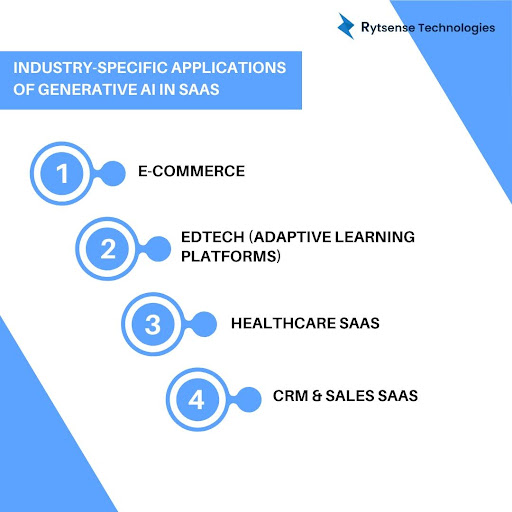-
Key Takeaways
- Generative AI changes SaaS development from rule-based automation to creative intelligence, which generates new code, content, and solutions.
- Business benefits encompass faster time to market, competitive advantages in crowded markets, and operational scalability through distributed computing architectures.
- Monetization strategies range from subscription-based pricing with AI features to usage-based billing models.
- Major risks include data privacy compliance (GDPR/ HIPAA), ethical challenges like AI hallucinations, and unpredictable operational costs and security vulnerabilities.
Generative AI in SaaS Development: Risks, Benefits & Use Cases

The world of Software as a Service (SaaS) is changing quickly. Companies are using generative AI in SaaS development to produce more intelligent, and better software. This new technology is taking big strides in how we develop and deliver software solutions. Let's analyze what this means for businesses and developers as of today.
What is generative AI in SaaS development?
Generative AI in SaaS Development means leveraging intelligent computing systems that are capable of creating new content, code, and solutions without strict instructions. The traditional way that computers were programmed was through rules that computers should follow. Generative AI can learn, think, and develop new things by creating text, images, code, and user interfaces.
In terms of SaaS development, generative AI solutions create software faster and more intelligently. If you think of Generative AI as a super intelligent assistant, it will work tirelessly on multiple tasks at a time. This is one of the AI Development Services that companies are now starting to leverage to develop better software products.
How it differs from traditional SaaS AI solutions?
Traditional SaaS AI solutions (those you know of) work like a smart calculator. They look at the data, and the users' insights presented with problems, and they rationalize their conclusions through rules someone else has programmed. Generative AI is a little different; it creates things that were not existent before.
| Traditional SaaS | Generative AI in SaaS |
|---|---|
| Follows set rules | Creates new content |
| Analyzes existing data | Generates new data |
| Limited responses | Unlimited possibilities |
| Rule-based decisions | Creative problem-solving |
| Predictable outputs | Novel solutions |
For instance, an old AI might just tell you which customers would likely buy your product. However, Generative AI can compose unique emails for each customer, produce custom demos for each product, design new features to serve new user requirements.
Why Generative AI Matters for SaaS Companies?
The shift from rule-based automation to generative intelligence
Companies are transitioning from basic automation to intelligent, generative AI systems. Fixed-rule process automation can execute exactly as defined. On the contrary, generative AI can think; it can conceive new solutions and explore new possibilities. This framework shift from pure automation to generative AI is significant for any company wishing to maintain a competitive position in today’s marketplace.
Generative AI Development firms are helping companies through this transition, building systems not only with the ability to automate, but also to generate increased value over time.
Market growth and adoption trends in SaaS
Exceeding 40% CAGR, the generative AI SaaS market loosens enterprise adoption through API-first architectures and transformer-based models. Organizations leveraging AI Consulting Services embrace microservices patterns, use vector databases, and design Springboards, embedding frameworks for semantic search capabilities.
Organizations report 25 - 45% productivity increases through automated code generation, natural language processing pipelines, and multi-modal inference engines built into their core platform architectures, not as add-ons.
Want to Explore Generative AI for Your SaaS?
Stay ahead in the competitive SaaS market by integrating AI-driven automation, personalization, and predictive insights.
Key Use Cases of Generative AI in SaaS Development

Generative AI offers endless possible use cases in the SaaS development space that ultimately alter the functionality and impact of the software platform being created for users. From automated content generation to digital customer service department-solving capabilities, various generative AI use cases show the diversity and effectiveness of generative AI technology. Let’s take a look at the most significant ways that SaaS companies are utilizing this disruptive technology in today’s environment.
AI-driven content creation and personalization
One of the largest use cases people are using generative AI in SaaS development is automated content generation, as it relates to generating blog posts, marketing content, and even personalized content for certain users. Companies that provide AI-powered Generative AI Development Services offer businesses, as their clients, the ability to implement and develop these options.
This can all be accomplished because the AI can analyze what each user will typically prefer and generate personalized content for each user. Making personalized content will allow users to be much more engaged in their products and happier with their product.
Automated UI/UX Design and Prototyping
Generative AI is now able to design user interfaces, as well as create prototypes, successfully and instantaneously. Where companies used to take weeks to design screens and layouts for their software, AI can create endless multiple screens and layouts within minutes. This process will greatly speed up the development phase and allow teams to work through options quickly and efficiently.
Synthetic data generation for testing & compliance
Testing software means that development teams will need to use a lot of data to test their software, however, real user data may be sensitive. For that reason, generative AI creates generic data that may appear real, while respecting user data and privacy. This synthetic data the AI creates can alleviate the worry of breaking privacy laws and unnecessary exposure to real user data by facilitating more complete testing.
Virtual assistants and AI-powered customer support
SaaS companies are using generative AI to build intelligent customer support agents into their solutions. These intelligent AI agents can comprehend individuals’ more complex questions and provide them helpful answers in real-time, 24/7. Each agent learns from their conversations and gradually improves over time.
AI-driven product recommendations and personalization engines
Generative AI enables SaaS platforms to recommend products and features to a user, not just based on what other similar users also liked, but rather making personalized resident recommendations for each user based on behavior and preferences.
Predictive User Behavior Analytics
By analyzing user interaction data, session data, and sequencing behavioral data for behavioral patterns, generative AI incorporates advanced machine learning algorithms and neural networks. Generative AI can make probabilistic predictions about what users might do next by passing multidimensional user data through transformer models and recurrent neural networks. This intra-session and inter-session data can inform feature recommendations and changes to user journeys before an explicit user request occurs.
AI-assisted software/code development
Generative AI is introducing developments in the way developers document and write code, including products and services, hardware, and software. Agents can now document, review, and build your code autonomously. Doing this quicker and with fewer bugs and errors throughout the collaborative process.
| Use Case | Benefits | Implementation Time |
|---|---|---|
| Content Creation | 80% faster content production | 2-4 weeks |
| UI/UX Design | 60% faster prototyping | 1-3 weeks |
| Data Generation | 100% compliant testing data | 1-2 weeks |
| Customer Support | 24/7 availability | 3-6 weeks |
| Recommendations | 40% higher engagement | 4-8 weeks |
Also Read:
Benefits of AI in software developmentBusiness Benefits of Generative AI in SaaS
Generative AI can be implemented in SaaS environments and provide quantifiable business value overall. Companies will all see genuine increases in operational efficiencies, customer satisfaction, and improved overall competitive posture. All these gains turn into quantifiable business returns and strategic advantages that validate investments and propel growth.
Faster time-to-market with AI automation
Organizations that integrate generative AI in SaaS development can move into the market way faster than previously possible. The AI can do many tasks in days that would take weeks or even months. This speed to market and ability to adapt quickly to the market are great assets in gaining an advantage over competitors.
Cost efficiency and operational scalability
Through the use of containerized microservices and load-balanced algorithms, generative AI uses distributed computing architectures that automatically scale resources. By optimizing their programs to run on GPU and utilizing model parallelization, a single AI instance is able to handle thousands of simultaneous requests and still provide responses in under one second, depending on the payload size. Machine Learning Development Services use Kubernetes orchestration with automated provisioning to allow for horizontal scaling, and are able to offer a 60-80% reduction in operational overhead.
Enhanced customer engagement & retention
SaaS platforms can drive unique experiences for customers with generative AI. Personalization drives engagement and retention, but it is only driving engagement and retention because it drives a unique customer experience, which, when properly done, creates a sense of interest and relevance to their lives.
Improved decision-making through predictive insights
Generative AI does not stop at evaluating historical data; it also projects trends into the future and along the way assists a business in making better decisions. This predictive ability is very positive option for any business when planning for the future or developing viable strategies.
Competitive advantage in crowded SaaS markets
In today’s competitive market, generative AI offers companies a real advantage. Companies using the Best AI Development Company in USA have access to cutting-edge technologies that set them apart from their competitors.
Also Read:
Gen AI Development Company Essential GuideRisks and Challenges in Generative AI for SaaS

Generative AI does provide the potential for great opportunities, but using generative AI tools within a SaaS environment is not without risks and challenges. Companies must consider the complex issues with data privacy, security complications, and ethical considerations. It is fundamentally essential to recognize and understand these challenges to accomplishing AI implementation with a path to long-term business sustainability. These are some of the key risks and challenges in generative AI:
Data privacy and compliance risks (GDPR, HIPAA, etc.)
Generative AI is extremely powerful, but privacy risks may arise while using this technology for SaaS development. The AI will depend on data in order to learn, and that data must be kept secure. Companies must comply with numerous regulations such as HIPAA and GDPR, while still finding ways to reap the benefits of AI technology.
Security vulnerabilities and access control issues
AI systems can be attractive targets for hackers, who may try to fool the AI into disclosing sensitive information or misbehaving in some other way. Security precautions must be taken seriously.
Ethical challenges: bias, hallucinations, misinformation
Generative AI can produce inaccurate or problematic information. It can sometimes “hallucinate,” which essentially means that it creates false information that is difficult to detect. Companies need to have appropriate monitoring and testing procedures in place to limit the likelihood of these events occurring.
Cost unpredictability (LLM usage, infra scaling)
The costs associated with the operation of generative AI solutions can be unpredictable. While AI is now more accessible and critical for differentiating a SaaS offering, costs can surge to levels you had not anticipated when more users start interacting with the AI. Companies providing Computer Vision Development Services and other AI services will need to closely monitor and manage costs.
Shadow AI and governance concerns
Sometimes employees use AI applications without approval by the company, altogether called "shadow AI." This carries security risks, regulatory risks, and compliance risks. Companies need clear and concise rules regarding AI-related features and software.
| Risk Category | Impact Level | Mitigation Strategy |
|---|---|---|
| Data Privacy | High | Implement strict data governance |
| Security | High | Regular security audits |
| Bias | Medium | Continuous AI testing |
| Cost | Medium | Usage monitoring systems |
| Governance | Medium | Clear AI usage policies |
Monetization Strategies for Generative AI in SaaS
Generating revenue through generative AI features requires strategic pricing approaches that account for the real value generated for the customer and the company’s ability to capture that value for future viability. SaaS companies are generally working with a variety of monetization models and trying to figure out how to capture the value that comes from their AI abilities. The monetization strategy you choose will affect the usage by your customers as well as the financial viability of your company.
Subscription-based pricing with AI features
Most SaaS companies simply add the AI capabilities to their existing subscription plans and charge customers for the AI version at a higher amount than a customer would pay for a non-AI version. In this way, the calculation for both companies and customers are linear and predictable.
Usage-based billing (pay-per-generation model)
Some companies have a model based on how much customers are actually using AI capabilities as part of the subscription plan. In this "pay-per-generation" pricing model they will only charge customers for what they are using. This is fair to customers but makes pricing unpredictable for companies.
Add-on AI modules vs embedded features
Companies can choose to charge for AI capabilities as either modules: modules that they will charge you for on top of a SaaS subscription, or embed into the SaaS software functionality. Modules create more revenue opportunities but may limit multi-user and adoption of AI capabilities. Embedded software functionality provides customers with a better user experience but it would be challenging to create and monetize as a separate order item.
Value-based pricing aligned with business outcomes
The highest-level of sophistication would be AI pricing customers with pricing based on the value delivered into their organization. If the AI allows a customer to reduce costs based on inflation, or increase revenues on sales, the pricing would consider those events.
Industry-Specific Applications of Generative AI in SaaS

E-commerce (personalized shopping experiences)
Online retailers leverage generative AI to provide tailored shopping experiences. The AI can generate product descriptions, custom recommendations and product layouts which can each be personalized to the individual shopper.
EdTech (adaptive learning platforms)
Educational technology (EdTech) platforms utilize generative AI to build adaptive learning experiences. By analyzing each student's learning style and their progress through each subject, the AI will generate lessons, quizzes, and explanations as learning experiences for these students.
Healthcare SaaS (synthetic medical data, AI assistants)
Healthcare SaaS platforms are employing generative AI to create synthetic medical data for research and training activities. AI assistants are able to help doctors and nurses with documentation and patient care recommendations.
CRM & Sales SaaS (AI-driven lead scoring, intelligence)
CRM SaaS platforms are utilizing AI to provide lead scoring and sales intelligence. AI allows staff to generate personalized sales pitches and make predictions about which prospects are more likely to buy.
| Industry | Primary AI Applications | Expected ROI |
|---|---|---|
| E-commerce | Personalization, Content | 25-40% |
| EdTech | Adaptive Learning | 30-50% |
| Healthcare | Synthetic Data, Assistants | 20-35% |
| CRM/Sales | Lead Scoring, Intelligence | 35-60% |
Still Unsure About Generative AI in SaaS?
Discover how AI can fit into your business model with tailored strategies and expert guidance.
Future of Generative AI in SaaS Development
Generative AI will continue to advance for the foreseeable future in SaaS development. Emerging applications will revolutionize how software platforms are built, delivered, and leveraged by their users. Examples include autonomous AI agents (moving beyond chatbots), multimodal composability across tools, and cost-effectively generating any piece of content or analysis on demand. These applications create new opportunities to innovate and differentiate competitive strategies for SaaS marketplace participants.
Rise of AI agents in SaaS platforms
Generative AI in SaaS development is headed towards an era of autonomous AI agents operating complex systems with limited need for human attention. Customer services, data analysis, and software development are examples of tasks these autonomous agents will be capable of handling.
Integration with AgentOps & MLOps practices
AgentOps implements Continuous Integration/Continuous Deployment (CI/CD) pipelines with automated model versioning, A/B testing frameworks, and real-time monitoring through Prometheus and Grafana. MLOps incorporates Docker containerization, Kubernetes orchestration, and automated retraining pipelines with Apache Airflow to enable drift and version monitoring, feature store management, and automated rollback approaches for production AI systems.
Next-gen personalization with multimodal AI
Next generation AI systems will be multimodal and operate using text, images, voice, and video simultaneously. This strong multimodal dimension of personalization will produce an even more tailored and immersive user experience.
Long-term cost vs value balance for SaaS providers
As the generative AI technology matures, the costs are expected to decline while the overall value increases. A result of this would be more accessibilities to AI SaaS development services at lower price points for smaller businesses, and more SaaS company access to generative AI to broaden their competitive advantage.
Barriers to entry for generative AI SaaS adoption will likely become fewer over time, as the generative AI technology we use becomes more mature, standardized, and easier to implement.
How Rytsense Technologies Can Help?
Rytsense Technologies provides full-service Generative Ai Consulting Services to assist organizations through the process of implementing AI in their business models. Our team provides comprehensive AI Development Services to help organizations from strategic consulting to implementation and maintenance.
We specialize in Generative Ai Development Services, which we provide based on your unique business case. Rytsense Technologies can build solutions in areas such as AI Agent Development Services, Machine Learning Development Services and Computer Vision Development Services that produce business value.
We provide solutions that include the following services:
- Strategic planning and roadmapping for AI
- Custom model development and training
- Integrate AI into existing SaaS Solutions
- Ongoing support and improvements
- Compliance and security implementation
We understand all of the unique challenges organizations face when implementing generative AI in SaaS development and are uniquely qualified to assist in overcoming those challenges.
Conclusion
Generative AI will reshape SaaS development. Vast opportunities exist for innovation, efficiency, and competitive advantage; but new challenges will emerge in a world underpinned by Generative AI and companies will require careful planning and management of the new challenges they will encounter.
Success with generative AI will often depend on getting the right strategy, technology partners and implementation method. Companies that thoughtfully embrace the technology will be well positioned to not only be successful in SaaS development, but to be successful in the future.
The future of generative AI in SaaS is bright, with constantly emerging new applications and capabilities.
Shape the Future of Your SaaS with Generative AI
Adopt AI-powered solutions that keep you ahead of the curve in innovation and customer engagement.

The Author
Karthikeyan
Co Founder, Rytsense Technologies